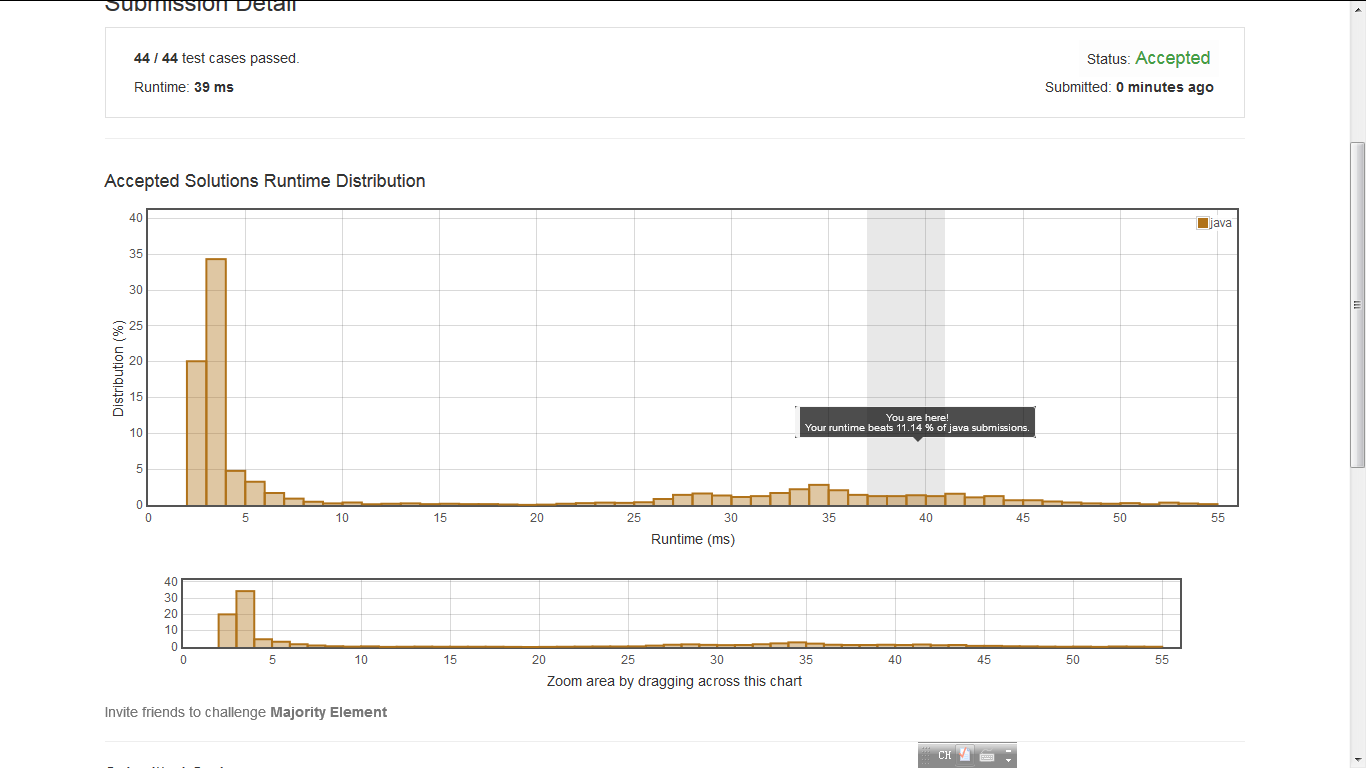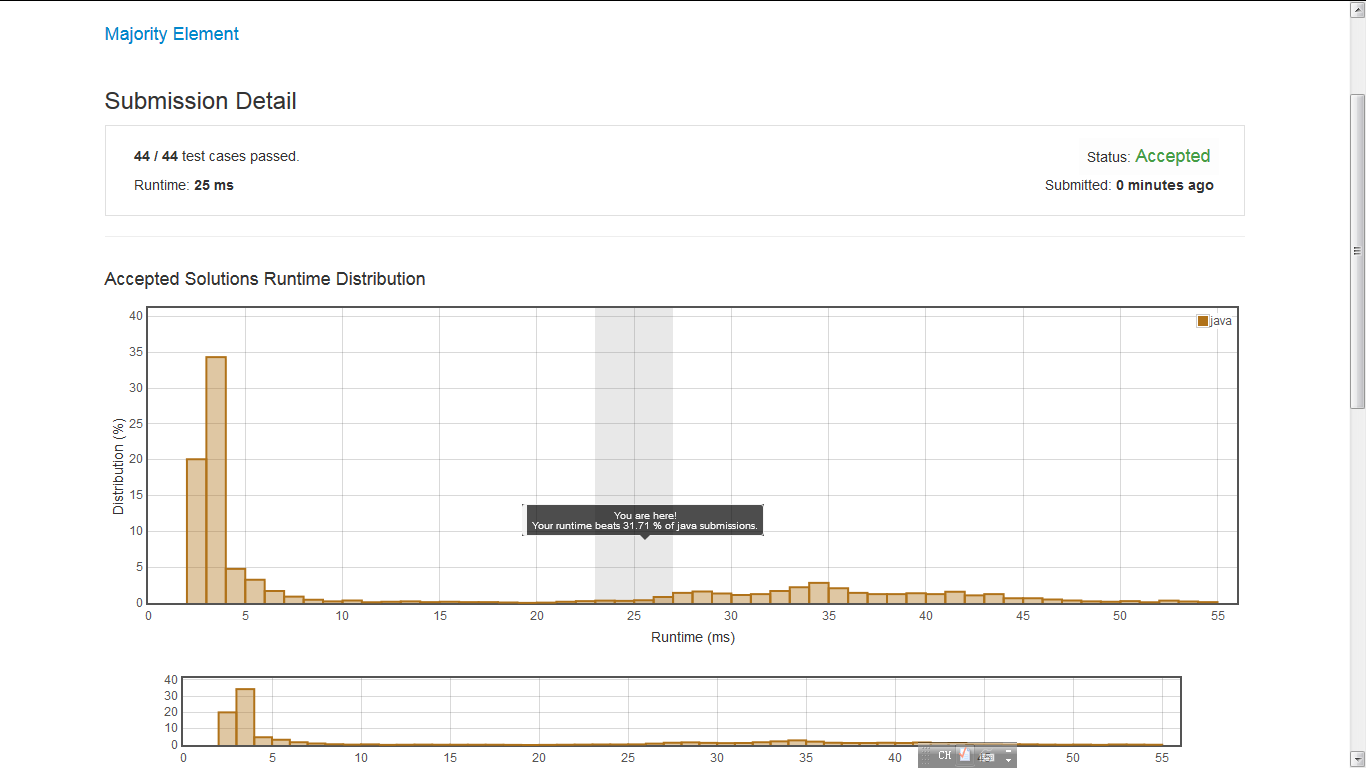LeetCode 169. Majority Element
问题:
Given an array of size n, find the majority element. The majority element is the element that appears more than ⌊ n/2 ⌋ times.
You may assume that the array is non-empty and the majority element always exist in the array.
分析:
1 计数?
2 HashMap
first try:
import java.util.Map; import java.util.HashMap; class Solution { public int majorityElement(int[] nums) { Map<Integer, Integer> elementCountMap = new HashMap<Integer, Integer>(); for(int i=0; i<nums.length; i++) { if(elementCountMap.containsKey(nums[i])) { int count = elementCountMap.get(nums[i]); elementCountMap.put(nums[i], count++); } else { elementCountMap.put(nums[i], 1); } }// int majorElement = 0; for(Map.Entry entry : elementCountMap.entrySet()) { if ((nums.length/2)<(Integer)entry.getValue()) { majorElement = (Integer)entry.getKey(); } } return majorElement; } }
result:
Submission Result: Wrong Answer Input: [2,2] Output: 0 Expected: 2
anylysis:
找了很久也找不到错误。甚至还处处println debug,后来发现了犯了低级错误! count++啊啊啊啊
second try:
import java.util.Map; import java.util.HashMap; class Solution { public int majorityElement(int[] nums) { Map<Integer, Integer> elementCountMap = new HashMap<Integer, Integer>(); for(int i=0; i<nums.length; i++) { if(elementCountMap.containsKey(nums[i])) { int count = elementCountMap.get(nums[i]); elementCountMap.put(nums[i], ++count); } else { elementCountMap.put(nums[i], 1); } }// int majorElement = 0; for(Map.Entry entry : elementCountMap.entrySet()) { if ((nums.length/2)<(Integer)entry.getValue()) { majorElement = (Integer)entry.getKey(); } } return majorElement; } }
result:

third try:
//import java.util.Map; import java.util.HashMap; class Solution { public int majorityElement(int[] nums) { HashMap<Integer, Integer> elementCountMap = new HashMap<Integer, Integer>(); for(int i=0; i<nums.length; i++) { if(elementCountMap.containsKey(nums[i])) { int count = elementCountMap.get(nums[i]); elementCountMap.put(nums[i], ++count); } else { elementCountMap.put(nums[i], 1); } }// int majorElement = 0; for(Map.Entry entry : elementCountMap.entrySet()) { if ((nums.length/2)<(Integer)entry.getValue()) { majorElement = (Integer)entry.getKey(); } } return majorElement; } }
result:

分析:
怎么效率还变差了。。。
try again:
//import java.util.Map; import java.util.HashMap; class Solution { public int majorityElement(int[] nums) { HashMap<Integer, Integer> elementCountMap = new HashMap<Integer, Integer>(); for(int i=0; i<nums.length; i++) { if(elementCountMap.containsKey(nums[i])) { int count = elementCountMap.get(nums[i]); elementCountMap.put(nums[i], ++count); } else { elementCountMap.put(nums[i], 1); } }// int majorElement = 0; for(Map.Entry entry : elementCountMap.entrySet()) { if ((nums.length/2)<(Integer)entry.getValue()) { majorElement = (Integer)entry.getKey(); return majorElement; } } return majorElement; } }
result:

精妙算法BM投票算法:
分析:
是流算法的一个prototypical example:
In computer science, streaming algorithms are algorithms for processing data streams in which the input is presented as a sequence of items and can be examined in only a few passes (typically just one). In most models, these algorithms have access to limited memory (generally logarithmic in the size of and/or the maximum value in the stream). They may also have limited processing time per item.
try:
class Solution { public int majorityElement(int[] nums) { int count=0; int currentMajor=nums[0]; for(int i=0;i<nums.length;i++){ if(nums[i]==currentMajor){ count++; }else{ count--; } if(count==0 && i+1<nums.length){ currentMajor=nums[i+1]; } } return currentMajor; } }
result:

conclusion:




【推荐】国内首个AI IDE,深度理解中文开发场景,立即下载体验Trae
【推荐】编程新体验,更懂你的AI,立即体验豆包MarsCode编程助手
【推荐】抖音旗下AI助手豆包,你的智能百科全书,全免费不限次数
【推荐】轻量又高性能的 SSH 工具 IShell:AI 加持,快人一步
· go语言实现终端里的倒计时
· 如何编写易于单元测试的代码
· 10年+ .NET Coder 心语,封装的思维:从隐藏、稳定开始理解其本质意义
· .NET Core 中如何实现缓存的预热?
· 从 HTTP 原因短语缺失研究 HTTP/2 和 HTTP/3 的设计差异
· 周边上新:园子的第一款马克杯温暖上架
· Open-Sora 2.0 重磅开源!
· 分享 3 个 .NET 开源的文件压缩处理库,助力快速实现文件压缩解压功能!
· Ollama——大语言模型本地部署的极速利器
· DeepSeek如何颠覆传统软件测试?测试工程师会被淘汰吗?